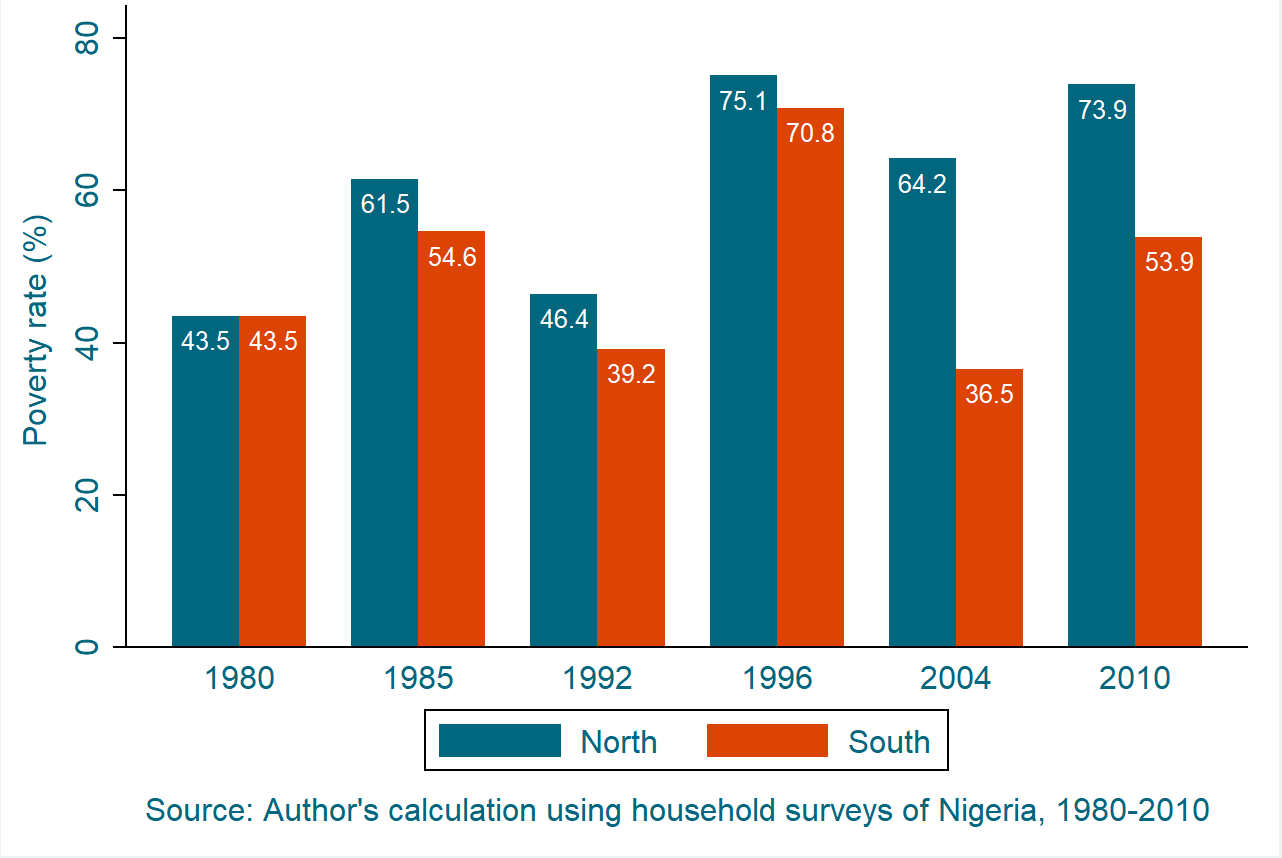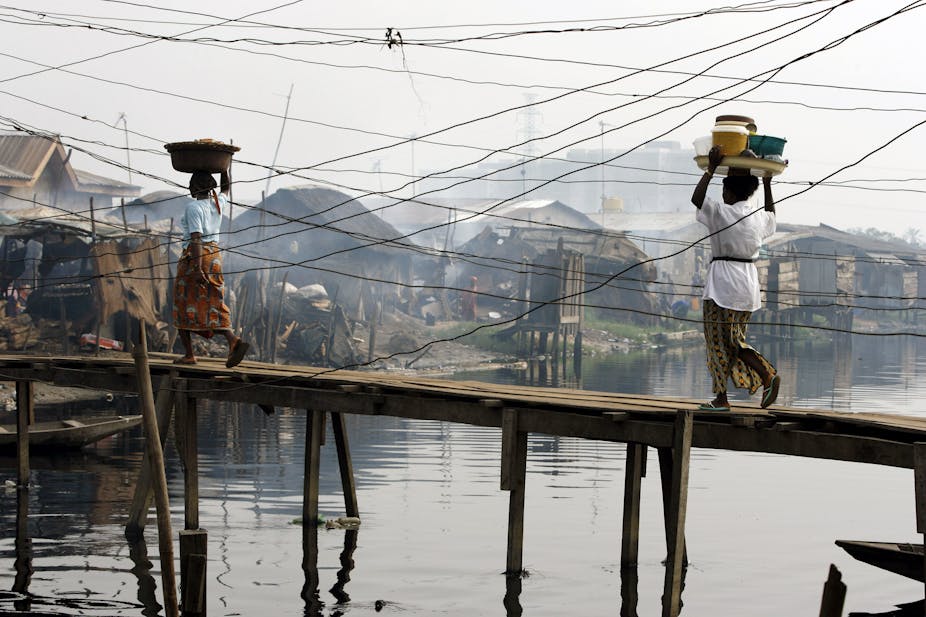The Great Divide: Understanding Nigeria's Economic Inequality and Its Implications
Nigeria is one of the largest economies in Africa, grapples with a staggering level of economic inequality. This essay delves deep into the roots, dimensions, and consequences of this divide. By examining historical, social, and economic factors, it uncovers the complexities that underpin Nigeria's unequal distribution of wealth and opportunities. Furthermore, it explores the far-reaching implications of this inequality on socio-political stability, human development, and economic growth. Through a comprehensive analysis, this article seeks to shed light on the challenges posed by Nigeria's economic divide and proposes strategies for fostering a more equitable and inclusive society.
Root of Economic Inequality in Nigeria
Amidst Nigeria's status as Africa's largest economy and one of the world's fastest-growing, a stark reality persists: over half of its population remains entrenched in extreme poverty, while a select elite enjoys unprecedented wealth. This report aims to provide an in-depth exploration of the current landscape of poverty and economic inequality in Nigeria, pinpointing key drivers of this disparity and proposing viable policy solutions.
In the past four decades, the chasm between economic classes has widened globally, affecting both developed and developing nations. Shockingly, in 2015, a mere 62 individuals possessed wealth equivalent to that of the poorest half of humanity, with the top one percent amassing more wealth than the entire remaining population combined. Nigeria epitomizes this extreme economic inequality, evident in the daily struggles of its majority populace juxtaposed with the exorbitant riches amassed by a privileged minority. Statistics paint a stark picture: despite Nigeria's economic growth, over 112 million people were living below the poverty line in 2010. To illustrate the gravity of wealth concentration, consider this: the wealthiest Nigerian would require 42 years to exhaust his wealth spending $1 million per day. Oxfam's analysis reveals that this individual's annual earnings from wealth alone could uplift two million people from poverty for a year. Yet, eradicating extreme poverty in Nigeria for a year would cost roughly $24 billion, a figure just shy of the total wealth amassed by the country's five richest individuals in 2016, totaling $29.9 billion.
Statistics paint a stark picture: despite Nigeria's economic growth, over 112 million people were living below the poverty line in 2010. To illustrate the gravity of wealth concentration, consider this: the wealthiest Nigerian would require 42 years to exhaust his wealth spending $1 million per day. Oxfam's analysis reveals that this individual's annual earnings from wealth alone could uplift two million people from poverty for a year. Yet, eradicating extreme poverty in Nigeria for a year would cost roughly $24 billion, a figure just shy of the total wealth amassed by the country's five richest individuals in 2016, totaling $29.9 billion.
What's particularly alarming about poverty in Nigeria is its persistence amidst economic expansion, where the fruits of growth disproportionately benefit a minority, leaving the majority behind. Despite impressive average annual growth rates exceeding 7% in the 2000s, Nigeria witnessed a surge in poverty levels, from 69 million in 2004 to 112 million in 2010, representing 69% of the population. Concurrently, the number of millionaires soared by approximately 44%, underscoring widening income inequality, as evidenced by the Gini Index climbing from 40% in 2003 to 43% in 2009.
Regional disparities compound Nigeria's inequality crisis, with the north-western states bearing the brunt of poverty. For instance, Sokoto State grapples with an 81% poverty rate, while Niger State's poverty incidence stands at 34%. Furthermore, economic and gender inequality intertwine, perpetuating a cycle of disadvantage for Nigerian women. Discriminatory socio-cultural norms consign women to low-paying, informal jobs, with limited access to education and property ownership. In Jigawa State, a staggering 94% of women are illiterate, compared to 42% of men, perpetuating their exclusion from economic, social, and political spheres.
Poverty and inequality in Nigeria stem not from a scarcity of resources, but from their mismanagement, misallocation, and misappropriation. At the core lies a pervasive culture of corruption and rent-seeking, perpetuated by a political elite disconnected from the daily struggles of ordinary Nigerians.
The intertwining of political and economic power distorts the distribution of opportunities, income, and wealth, favoring vested interests and shaping policymaking to benefit the affluent. One glaring consequence is the exorbitant cost of governance. Nigerian lawmakers rank among the world's highest-paid, with an average annual salary of $118,000, a staggering 63 times the country's GDP per capita. Moreover, bloated bureaucracies, inflated salaries, arbitrary increases in government agencies, and hidden allowances inflate the cost of governance, leaving scant resources for essential services for the majority.
Elite capture, corruption, and rent-seeking permeate public resource management, exacerbating inequality and hindering inclusive growth. According to the Economic and Financial Crimes Commission (EFCC), public officeholders siphoned off approximately $20 trillion from the treasury between 1960 and 2005, surpassing the GDP of the United States in 2012.
Nigeria's tax system exacerbates inequality, with the burden disproportionately falling on poorer individuals and companies. Multinational corporations benefit from dubious tax waivers and loopholes, redirecting profits to low-tax jurisdictions. These waivers, often exploited by the economic and political elite for patronage, result in an annual loss of $2.9 billion in potential revenues, equivalent to three times the country's health budget in 2015.
Additionally, companies shift profits to tax havens, as evidenced by a telecom company transferring $119 million of profits to its Dubai office, where operations were minimal, to evade appropriate taxes aligned with profits earned in Nigeria.
Conversely, to meet revenue targets, especially at the state level, the government resorts to aggressive taxation of the informal sector, leading to multiple taxes and human rights violations. Small and medium enterprises and informal sector workers bear the brunt of erratic taxes, further exacerbating inequality and stifling economic growth.
In conclusion, Nigeria's economic inequality is not only glaring but also deeply entrenched, posing significant challenges to the nation's progress and stability. Addressing this crisis demands multifaceted policy interventions targeting wealth redistribution, gender empowerment, and regional development to foster a more inclusive and equitable society.
Dimensions of Economic Inequality

Economic inequality manifests in various dimensions, including income inequality, wealth concentration, and disparities in access to education, healthcare, and basic services. This section employs quantitative data and case studies to elucidate the disparities across different segments of society and regions. Furthermore, it explores the intersectionality of factors such as gender, race, and geography in shaping patterns of inequality, providing insights into the diverse manifestations of economic disparity.
Causes of Economic Inequality
The roots of economic inequality are complex and multifaceted, influenced by a myriad of factors including globalization, technological advancements, tax policies, and institutional frameworks. This section delves into the underlying causes of inequality, examining how structural barriers, systemic discrimination, and unequal opportunities perpetuate disparities. Additionally, it explores the role of political and economic elites, rent-seeking behavior, and regulatory capture in exacerbating inequality, offering a comprehensive analysis of the forces driving economic disparity.
Implications for Society

Economic inequality has far-reaching implications for society, affecting social mobility, political stability, and intergenerational mobility. This section explores how inequality undermines social cohesion, exacerbates poverty, and perpetuates cycles of disadvantage. Moreover, it examines the impact of inequality on health outcomes, educational attainment, and crime rates, highlighting the detrimental effects on human development and well-being. Through empirical evidence and theoretical frameworks, this section provides insights into the social consequences of economic inequality and the challenges it poses for sustainable development.
Implications for Economic Growth

Economic inequality not only undermines social cohesion but also hampers economic growth and stability. This section examines the relationship between inequality and economic performance, exploring how disparities in income and wealth distribution constrain consumer demand, investment, and innovation. Furthermore, it analyzes the role of inequality in exacerbating financial instability, reducing productivity, and hindering long-term economic development. By synthesizing empirical research and economic theory, this section sheds light on the complex dynamics between inequality and economic growth.
Policy Interventions and Strategies
Addressing economic inequality requires a multifaceted approach encompassing policy interventions, institutional reforms, and societal changes. This section explores various policy tools and strategies for reducing inequality, including progressive taxation, investment in education and healthcare, social safety nets, and labor market reforms. Moreover, it examines the role of inclusive economic growth strategies, wealth redistribution mechanisms, and international cooperation in fostering more equitable societies. By analyzing successful case studies and best practices from around the world, this section provides insights into effective approaches for tackling economic inequality and promoting inclusive development.
In conclusion, economic inequality represents a significant challenge with profound implications for societies, economies, and individuals. By understanding its dimensions, causes, and consequences, policymakers, civil society organizations, and the private sector can devise informed strategies for promoting social justice, economic inclusion, and sustainable development. As we navigate the complexities of the 21st century, addressing economic inequality must remain a priority to build a more equitable and prosperous future for all.
Reference
Dabla-Norris, E., Kochhar, K., Suphaphiphat, N., Ricka, F., Tsounta, E. (2015). Causes and Consequences of Income Inequality: A Global Perspective. United States: INTERNATIONAL MONETARY FUND.
Cihak, M., Sahay, R. (2020). Finance and Inequality. United States: INTERNATIONAL MONETARY FUND.
Fund, I. M. (2014). Fiscal Policy and Income Inequality. United States: INTERNATIONAL MONETARY FUND.

































